Deadbeat Dad Quotes offer a poignant and reflective glimpse into the complex and often heart-wrenching world of parental absence. These quotes are more than just words; they are windows into the souls of fathers who, for various reasons, have failed to fulfill their roles in their children’s lives.
Through metaphors, similes, and stark admissions of regret, these quotes articulate the profound impact of a father’s absence, both on the children left behind and on the fathers themselves. They convey a range of emotions, from deep remorse to painful realization, capturing the essence of missed opportunities, unfulfilled responsibilities, and the longing for redemption.
Whether it’s through the metaphor of an unsung note in a symphony or the image of a ghost at a family feast, these quotes resonate with anyone who has experienced, observed, or reflected upon the consequences of paternal neglect.
Deadbeat Dad Quotes not only offer a mirror for self-reflection for those who have been absent but also provide a voice to the often unspoken emotional landscape of neglected familial bonds.
Deadbeat Dad Quotes
“The Absentee”
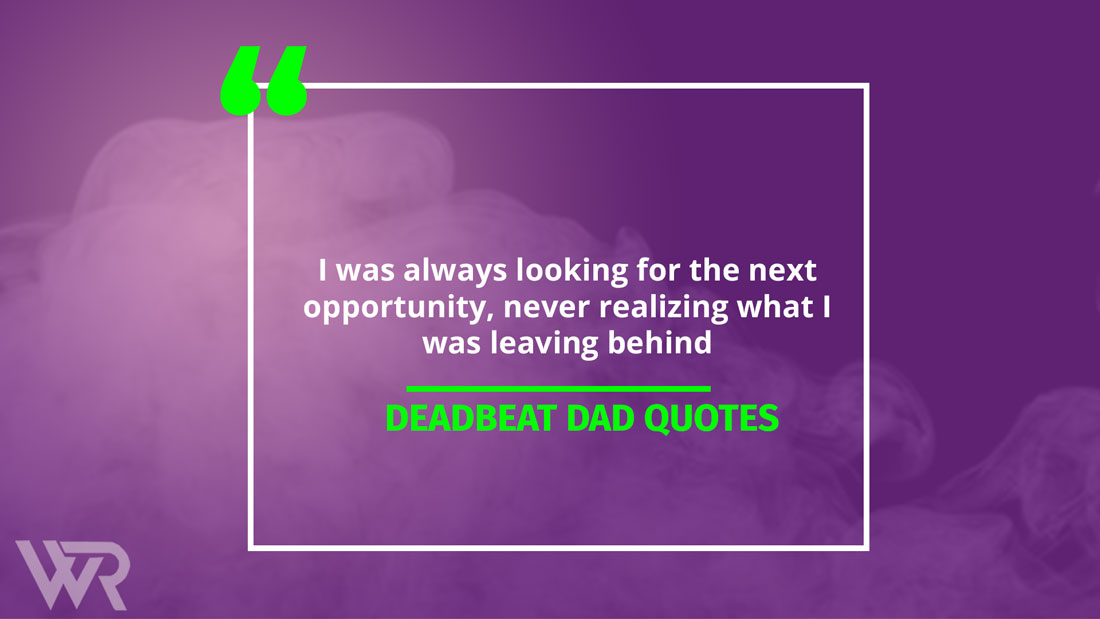
“I was always looking for the next opportunity, never realizing what I was leaving behind.”
In this poignant reflection, the speaker captures the essence of a “deadbeat dad” one whose focus on personal pursuits blinds him to his familial responsibilities.
The regret in this statement is palpable, highlighting the long-term impact of neglect. It’s a reminder that the pursuit of ambition or personal fulfillment should not come at the cost of abandoning one’s parental duties.
This quote serves as a wake-up call for those who prioritize their own needs over the emotional and physical well-being of their children.
“Missed Milestones”
“I missed more than birthdays; I missed a lifetime of moments.”
Here, the speaker acknowledges the depth of his absence, emphasizing that his neglect goes beyond missing a few special occasions.
This confession sheds light on the profound sense of loss and regret that can accompany the realization of missed opportunities in one’s child’s life.
It’s a sobering acknowledgment that being a parent is about more than just being physically present; it’s about being an active participant in the myriad of small, yet significant moments that make up a child’s life.
“The Excuse Maker”
“There was always something more important, or so I told myself.”
This quote reflects the self-deception often employed by those who shirk their parental responsibilities. It captures the essence of making excuses to justify one’s absence, a common trait among “deadbeat dads.”
The speaker’s self-awareness is a critical step toward acknowledging the damage caused by such negligence. It’s a cautionary tale about the ease with which one can rationalize away the neglect of their most crucial obligations.
Also Read: Bad Bitch Quotes (with Commentary)
“Deferred Responsibility”
“I thought there would be time to make it right, but time ran out.”
This statement encapsulates the regret that comes with procrastination in fulfilling parental duties. The speaker’s assumption that there would always be time to repair the relationship with their child underscores a common misconception among neglectful parents.
It serves as a warning that time is fleeting, and the opportunities to forge meaningful connections with one’s children should not be taken for granted or postponed.
“The Realization”
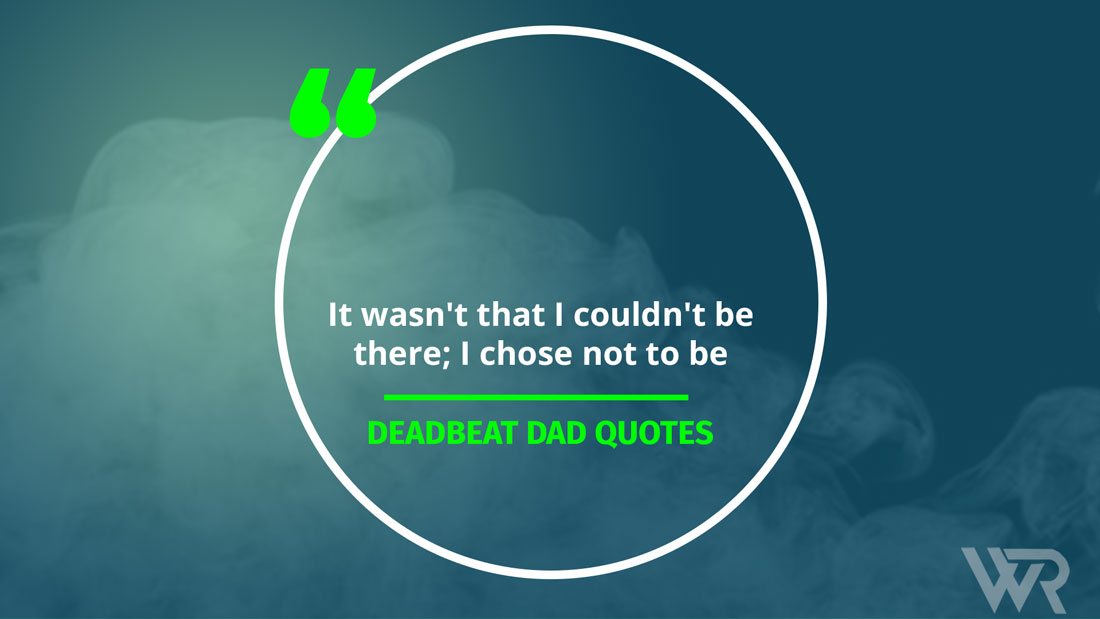
“It wasn’t that I couldn’t be there; I chose not to be.”
In this admission, the speaker confronts the harsh truth of their deliberate absence. This realization is crucial in understanding the nature of a “deadbeat dad”, it’s not always about the inability to be present, but rather a choice to prioritize other aspects of life.
This quote is a powerful reminder that parental responsibility is not something to be opted out of and that the choices one makes have lasting impacts on their children.
“The Reflection of Regret”
“Looking back, I was there for myself, not for them.”
This quote highlights the self-centered nature of a “deadbeat dad.” The speaker’s reflection on past behavior reveals a profound sense of regret and a recognition of the selfishness that drove their actions.
It’s an important acknowledgment that being a parent means putting one’s children’s needs and well-being above one’s own.
“The Wake-Up Call”
“When I finally wanted to be a part of their lives, it was too late.”
This quote captures the tragic realization that often comes to those who neglect their parental responsibilities for too long.
The speaker’s desire to reconnect with their children after a prolonged absence is met with the harsh reality that the bonds of trust and affection may be irreparably damaged.
It serves as a stark reminder that parental involvement needs to be consistent and nurturing from the start, as the consequences of neglect can be irreversible.
“The Unfulfilled Promise”
“I always said ‘tomorrow’, but tomorrow never came for us.”
This quote reflects the empty promises that characterize the behavior of a “deadbeat dad.” The continual deferral to a future that never materializes is a common theme in such situations.
It underscores the sad truth that intentions, no matter how well-meaning, are meaningless without action. The quote serves as a poignant reminder that promises to children are sacred and should not be made lightly or broken easily.
“The Unseen Impact”
“I didn’t realize that my absence was leaving scars, not just empty spaces.”
This statement delves into the often-overlooked emotional consequences of a father’s absence. It’s not just the physical presence that’s missing; it’s the emotional support, guidance, and love that are absent, leaving deep emotional scars.
This quote is a powerful acknowledgment of the unseen damage that neglect can inflict on a child’s psyche.
“The Denial”
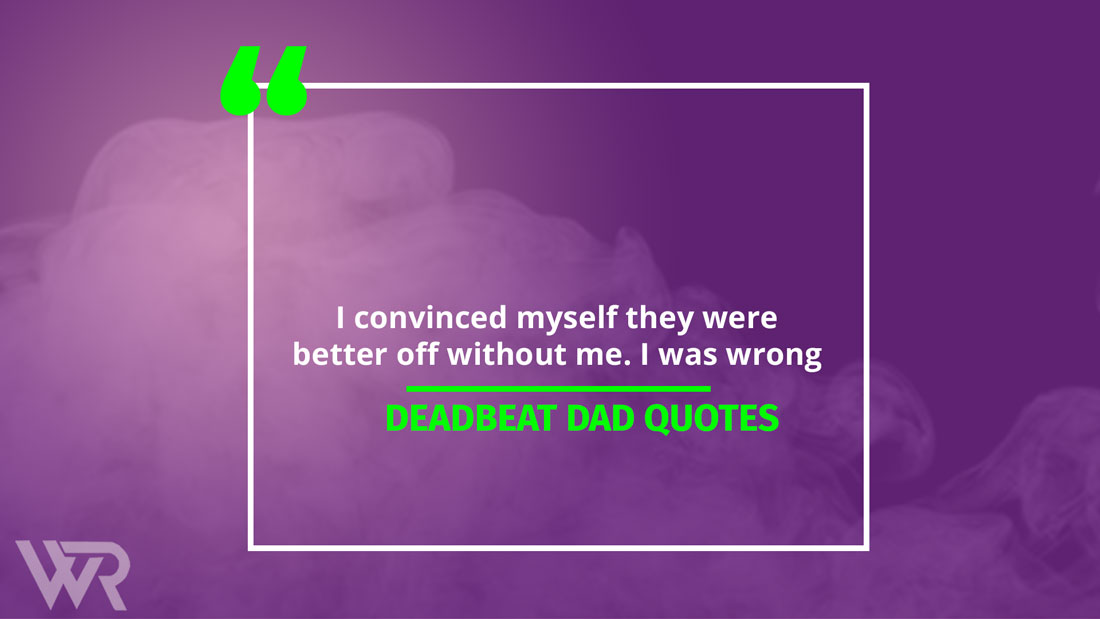
“I convinced myself they were better off without me. I was wrong.”
In this quote, the speaker reflects on the self-deception involved in justifying abandonment. It’s a common narrative among “deadbeat dads” to rationalize their absence as being in the child’s best interest.
This realization is a crucial step toward understanding the irreplaceable role of a father in a child’s life.
“The Mirror of Age”
“As I grow older, I see the void I’ve created, mirrored in my own loneliness.”
This quote reflects the long-term consequences of a father’s neglect, not just on the children but on himself as well.
As time passes, the neglectful father often finds himself facing the loneliness and regret of the relationships he failed to nurture. It’s a poignant reminder that the choices we make have lasting impacts, not just on others but also on ourselves.
“The Echo of Neglect”
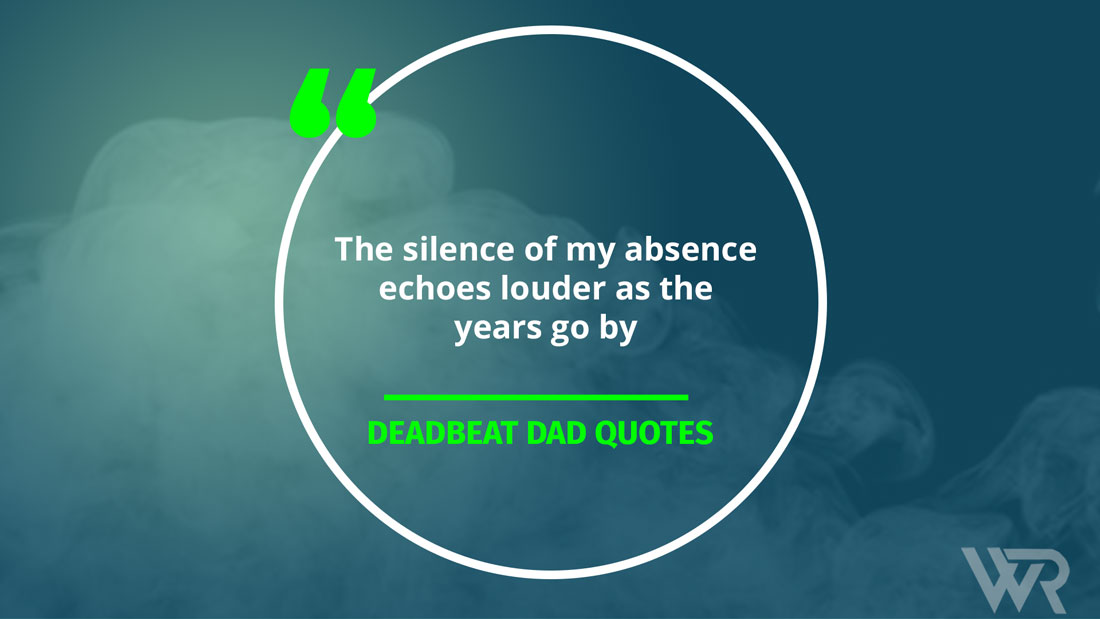
“The silence of my absence echoes louder as the years go by.”
This quote poignantly captures the enduring impact of a father’s absence. The metaphor of silence as an echo illustrates the growing realization and regret that accompanies the passage of time.
It’s a stark reminder that the void left by a parent’s neglect doesn’t diminish with time; instead, it often amplifies, resonating through the years.
“The Price of Freedom”
“I chose freedom over fatherhood, only to find that I was imprisoning myself.”
Here, the speaker acknowledges the irony in their pursuit of personal freedom at the cost of their parental responsibilities.
The realization that this supposed freedom is a form of self-imprisonment due to lost relationships and missed experiences is a profound reflection on the consequences of one’s choices.
“The Illusion of Independence”
“I told myself they didn’t need me, but it was I who needed them.”
This quote reverses the common narrative of a “deadbeat dad” who believes his absence is inconsequential.
It highlights the often-overlooked truth that the parent-child relationship is mutually beneficial and that the parent, too, loses out on essential emotional growth and connection.
“The Forgotten Role”
“In avoiding my role as a father, I forgot how to be a dad.”
The speaker here addresses the loss of identity and purpose that can accompany the neglect of fatherly duties. This quote emphasizes that being a father is not just a biological status but a role that requires active participation and engagement.
The regret of realizing this too late is a common theme among those who fail to fulfill their paternal responsibilities.
“The Journey of Regret”
“With every step I took away from them, I was unknowingly walking a path of regret.”
This final quote poetically encapsulates the journey of a “deadbeat dad.” Each decision to prioritize something over their child is a step on a path that ultimately leads to regret.
It’s a poignant metaphor for the cumulative nature of choices and their long-term consequences on both the parent and the child.
“The Shadow of Absence”
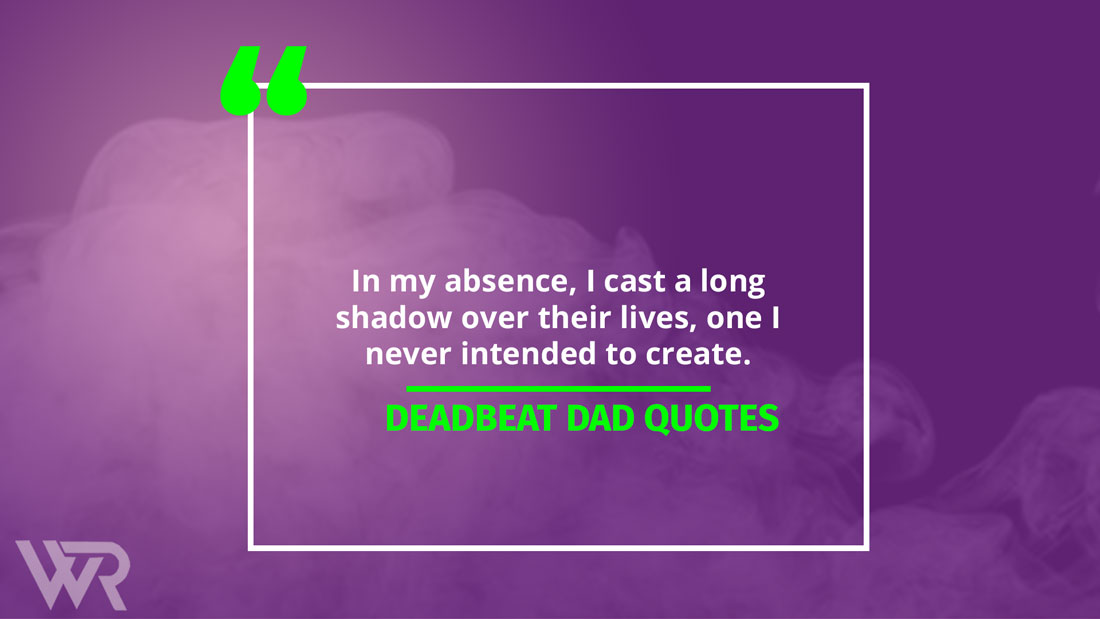
“In my absence, I cast a long shadow over their lives, one I never intended to create.”
This quote reflects on the unintended, yet profound impact a father’s absence can have on his children’s lives.
The metaphor of a shadow implies a constant, though unseen, presence — a reminder of what is missing. It highlights the emotional and psychological effects that linger in the wake of a parent’s neglect.
“The Misjudged Distance”
“I thought I was just a step away, only to realize I had drifted miles apart.”
Here, the speaker acknowledges the gradual and often unnoticed widening of the gap between themselves and their children.
This quote speaks to the common misconception among neglectful parents that they can easily bridge the distance they’ve allowed to develop, not realizing the extent of the emotional and relational drift.
“The Lost Years”
“Years slipped through my fingers like sand, each grain a moment I failed to grasp.”
This poetic reflection uses the metaphor of sand slipping through fingers to represent the lost opportunities and moments in a child’s life.
It’s a poignant reminder of the fleeting nature of time and the regret that comes with realizing that precious moments, once gone, cannot be reclaimed.
“The Ripple of Consequences”
“Every choice I made sent ripples through their lives, each one a wave I didn’t see.”
This quote reflects on the far-reaching and often unseen consequences of a father’s actions (or inactions) on his children.
The ripple effect metaphor illustrates how even small choices can have significant, lasting impacts on others, particularly one’s children.
“The Bridge Burned”
“I burned the bridge of trust and now stand on an island of regret.”
In this final quote, the speaker uses the metaphor of a burned bridge to symbolize the destruction of trust and connection with their children.
The image of standing alone on an island conveys the isolation and regret that result from such actions, highlighting the permanence of some decisions and their irreversible impact on relationships.
“The Unseen Growth”
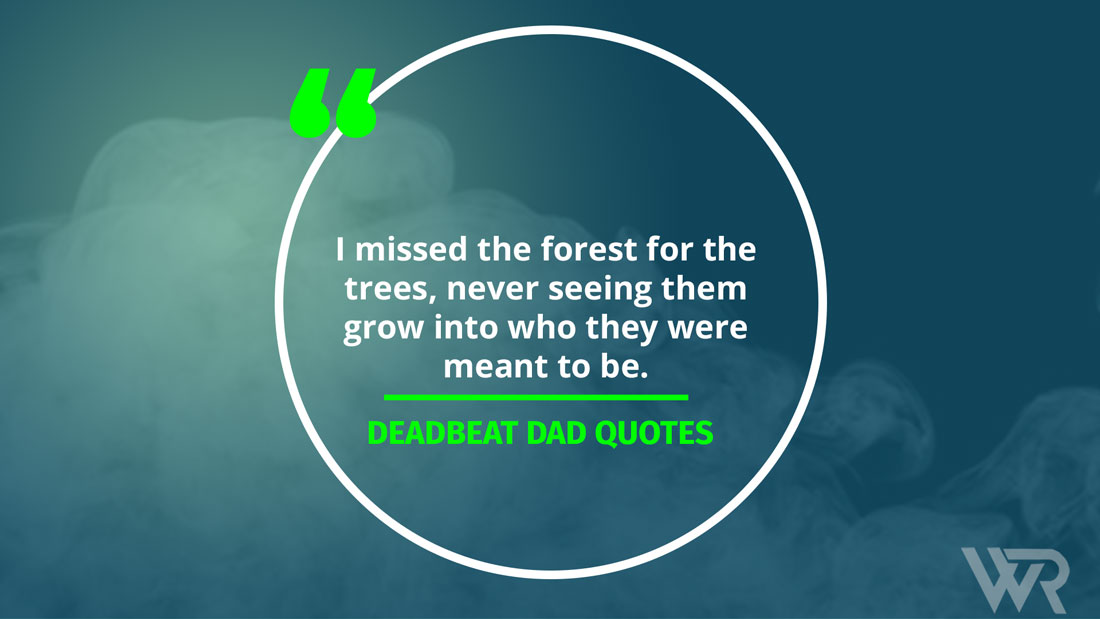
“I missed the forest for the trees, never seeing them grow into who they were meant to be.”
This quote encapsulates the regret of a parent who was so caught up in minor details or personal pursuits that they failed to witness the significant growth and development of their children.
It’s a metaphor for losing sight of the bigger picture , the essential role of being present in one’s children’s lives.
“The Mirror of Time”
“As time passed, my reflection in their eyes dimmed, until I was no longer there.”
Here, the speaker reflects on how their image and importance in their children’s eyes gradually faded due to their absence.
This quote poignantly illustrates the loss of identity and connection in the parent-child relationship due to neglect.
“The Forgotten Promise”
“I made promises like leaves in the wind, never to be caught or fulfilled.”
This metaphor of leaves in the wind symbolizes the fleeting, ungrounded promises made by the speaker.
It emphasizes the unreliability and the transient nature of commitments that are made but not kept, highlighting the impact of broken promises on children.
“The Path Not Taken”
“At every fork in the road, I chose the path away from them, not realizing it was the road to my own loss.”
This quote speaks to the series of choices a parent makes that lead them away from their children.
The realization that each decision not only distanced them from their children but also led to their loss is a profound insight into the consequences of one’s actions.
“The Hourglass of Regret”
“As the sands of time fell, so did my chances to be the father they needed.”
Here, the speaker uses the image of an hourglass to symbolize the passing of time and the diminishing opportunities to fulfill their role as a father.
It’s a poignant reminder of the relentless march of time and the regret that accompanies missed opportunities to be present in one’s children’s lives.
Also Read: Bad Bunny Quotes (with Commentary)
“The Reflection in the Water”
“I looked for myself in other waters, missing my reflection in their lives.”
In this quote, the speaker admits to seeking fulfillment and identity outside of their role as a parent, neglecting to see their importance and impact in their children’s lives.
It’s a metaphor for missing out on the vital role a parent plays in shaping their child’s identity and life.
“The Whisper of Absence”
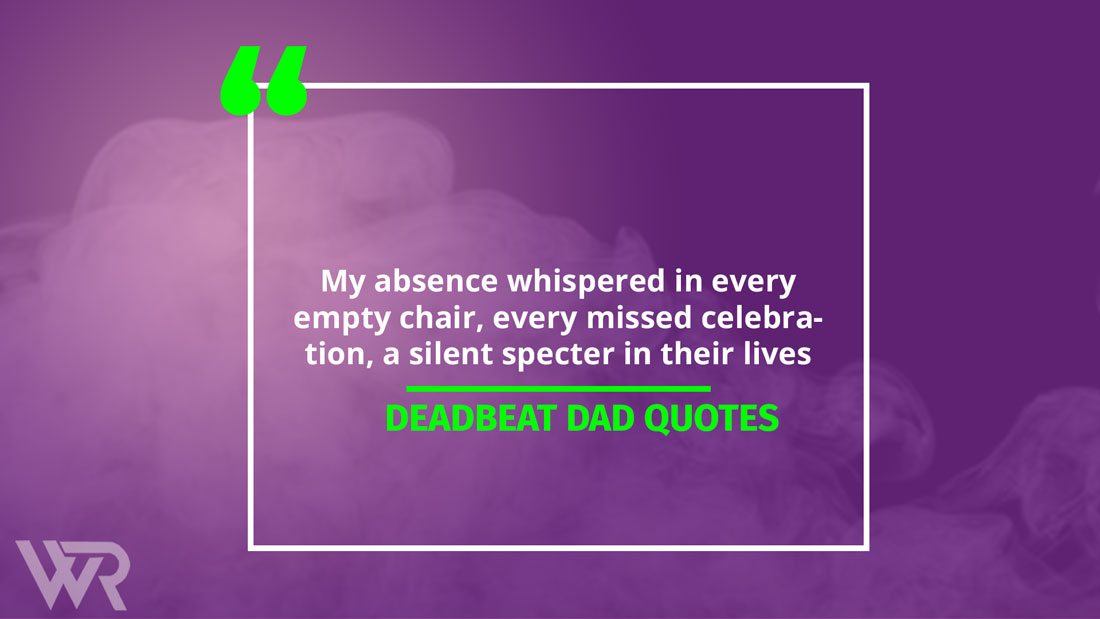
“My absence whispered in every empty chair, every missed celebration, a silent specter in their lives.”
This quote powerfully evokes the pervasive presence of a parent’s absence, felt in everyday moments and milestones.
It’s a poignant reminder of the impact of not being there, not just in major events but in the quiet, everyday spaces of a child’s life.
“The Fading Footsteps”
“I walked away, not hearing the echo of my footsteps in their halls of memory.”
Here, the speaker reflects on their decision to walk away from their parental responsibilities, oblivious to the lasting impact this would have on their child’s memories.
It’s a metaphor for the enduring impression that a parent’s presence, or lack thereof, leaves in a child’s life.
“The Silent Story”
“My story in their lives was written in silence, a tale of absence more profound than words.”
This quote captures the profound impact of a father’s silence and absence in the narrative of his children’s lives.
It’s a poignant reminder that sometimes what is left unsaid or undone can have a more lasting effect than any spoken word.
“The Missed Dance”
“Life was a dance they invited me to, but I never took the floor with them.”
In this statement, the speaker acknowledges missing out on the shared experiences and joys of life with their children.
The dance metaphor symbolizes the celebratory and participatory aspects of life that a parent misses when they are absent.
“The Silent Witness”
“I became a silent witness to their lives, watching from a distance, never stepping in.”
This quote poignantly captures the regret of a parent who realizes they have been nothing more than a bystander in their children’s lives.
The metaphor of a “silent witness” powerfully conveys the passivity and detachment of a father who observes but does not participate in the growth and experiences of his children. It’s a stark reminder of the emotional distance that can grow when a parent fails to engage actively in their children’s lives.
The image of ‘watching from a distance’ emphasizes the gap between intention and action, highlighting the missed opportunities for connection and support.
“The Lost Compass”
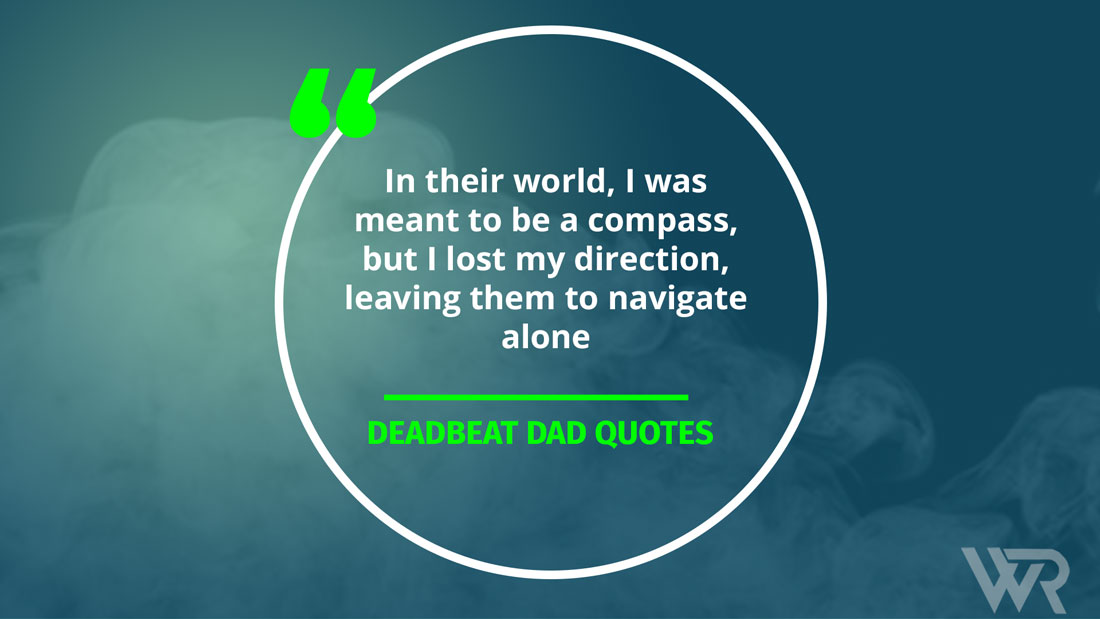
“In their world, I was meant to be a compass, but I lost my direction, leaving them to navigate alone.”
This quote reflects a deep sense of regret from a father who acknowledges his failure to provide guidance and direction. The metaphor of a compass is apt in describing a parent’s role in offering guidance and stability.
By admitting he lost his way, the speaker highlights the profound impact of his absence on his children, who were left to find their paths without the support and direction they needed. It’s a powerful admission of the crucial role a parent plays in shaping their child’s journey and the lasting effect of their absence.
“The Shadowed Path”
“I walked a shadowed path, leaving only faint traces in their lives.”
In this quote, the speaker laments their peripheral and obscure role in their children’s upbringing. The imagery of a “shadowed path” suggests a journey taken in darkness or obscurity, symbolizing the lack of clarity and presence in their role as a parent.
The mention of “faint traces” underscores the minimal impact and fleeting presence they had, signifying a deep regret for not being a more significant and positive influence in their children’s lives. It’s a metaphor for the subtle yet profound ways in which a parent’s absence can affect a child’s development and sense of self.
“The Unseen Anchor”
“I was an anchor that never held, leaving them adrift in a sea of uncertainty.”
This quote uses the metaphor of an anchor to describe the speaker’s failure to provide stability and security for their children. An anchor symbolizes steadiness and grounding, and the speaker’s admission of being an ineffective anchor highlights the turmoil and uncertainty his children faced without his support.
The imagery of being adrift in a sea conveys the challenges and confusion children can experience when a parent fails to provide a solid foundation in their lives. It’s a poignant reflection on the importance of a parent’s role in offering a sense of safety and direction.
“The Forgotten Harvest”
“I sowed seeds in their hearts, but never stayed to see the harvest.”
Here, the speaker acknowledges the initial role they played in their children’s lives but expresses regret for not being present to witness and contribute to their growth and development.
The metaphor of sowing seeds and missing the harvest beautifully encapsulates the idea of starting something meaningful but failing to nurture it to fruition.
This quote reflects the sadness and remorse of a parent who realizes the lost opportunities to cultivate and enjoy the results of their early efforts in their children’s lives.
“The Echoing Void”
“In the halls of their memories, my absence echoes louder than my presence ever did.”
This quote captures the profound impact of a parent’s absence, which can resonate more significantly than any active involvement they might have had.
The metaphor of echoing in the halls of memory suggests that the emptiness left by a parent’s absence can become a defining feature of a child’s recollection of their upbringing.
It’s a somber acknowledgment that sometimes what is not done or said can leave a more lasting impression than what is, highlighting the importance of consistent presence and engagement in a child’s life.
“The Faded Photograph”
“In the album of their lives, I am but a faded photograph, a reminder of what could have been.”
This final quote uses the metaphor of a faded photograph to symbolize the speaker’s diminishing role and presence in their children’s lives. A photograph captures a moment in time, and the fading of it suggests the gradual loss of significance and clarity over time.
This imagery poignantly conveys the feeling of being a distant memory, a mere remnant of a potential that was never fully realized. It’s a reflective and melancholic acknowledgment of missed opportunities and the irreversible nature of time and neglect.
“The Unfinished Symphony”
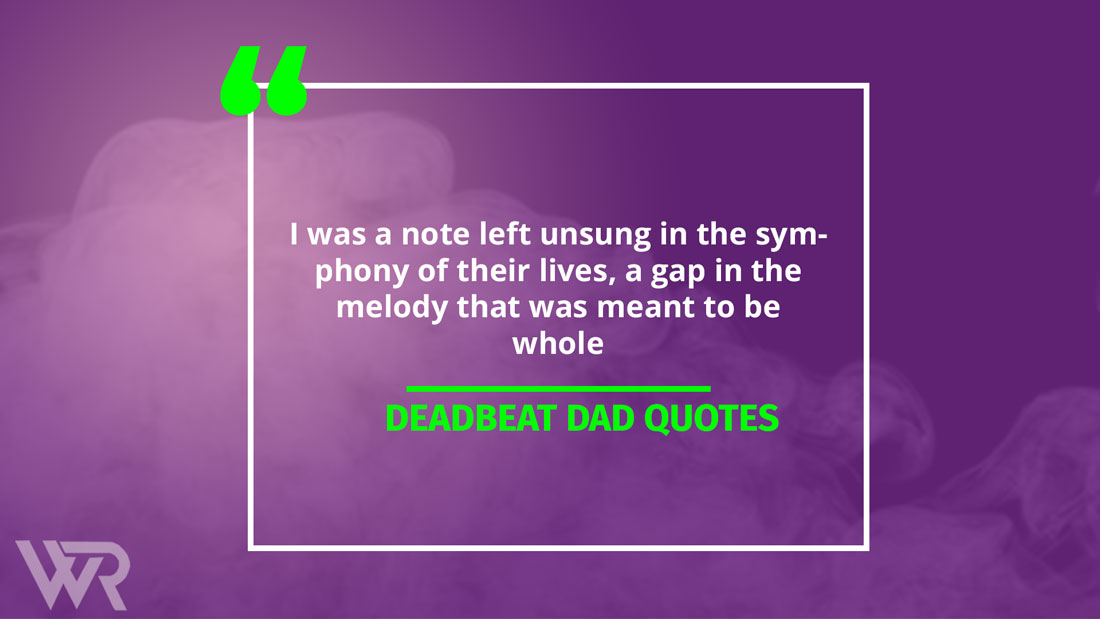
“I was a note left unsung in the symphony of their lives, a gap in the melody that was meant to be whole.”
This quote conveys the regret of a parent who realizes they are an absent note in the beautiful symphony that is their child’s life.
The metaphor of an unfinished symphony aptly illustrates the incompleteness and disharmony caused by their absence. It’s a poignant reminder of how each parent plays a crucial role in the harmony of their child’s development, and missing notes can leave a profound impact.
“The Forgotten Path”
“I set them on a path and walked away, never looking back to see if they stumbled or strayed.”
Here, the speaker expresses regret for setting their children on a life path but failing to accompany them along the way.
This quote reflects the sorrow and guilt of a parent who realizes that guiding a child requires more than just initial direction; it involves walking the journey with them, being present for their trials and triumphs.
“The Distant Star”
“In the constellation of their lives, I was a distant star, barely visible, barely felt.”
In this quote, the speaker acknowledges their minimal and distant presence in their children’s lives.
The imagery of a barely visible star in a constellation underlines the feeling of being peripheral and insignificant in the grand scheme of their child’s universe, highlighting the missed opportunity to be a guiding light.
“The Unanswered Echo”
“I called out to them from afar, but my voice was an unanswered echo, dissipating in the wind.”
Here, the metaphor of an unanswered echo symbolizes the failed attempts at communication and connection from a distance.
It reflects the futility of trying to be a part of a child’s life without being physically and emotionally present and the painful realization that words alone cannot bridge the gap created by absence.
“The Unwritten Poem”
“Their lives were poems, and I missed the chance to be a verse, a rhyme forgotten in time.”
This quote beautifully expresses the speaker’s regret for not being an integral part of their children’s life stories.
Poems represent beauty, rhythm, and meaning, and the metaphor of an unwritten verse signifies the lost opportunity to add depth and richness to their children’s experiences.
“The Ghost at the Feast”
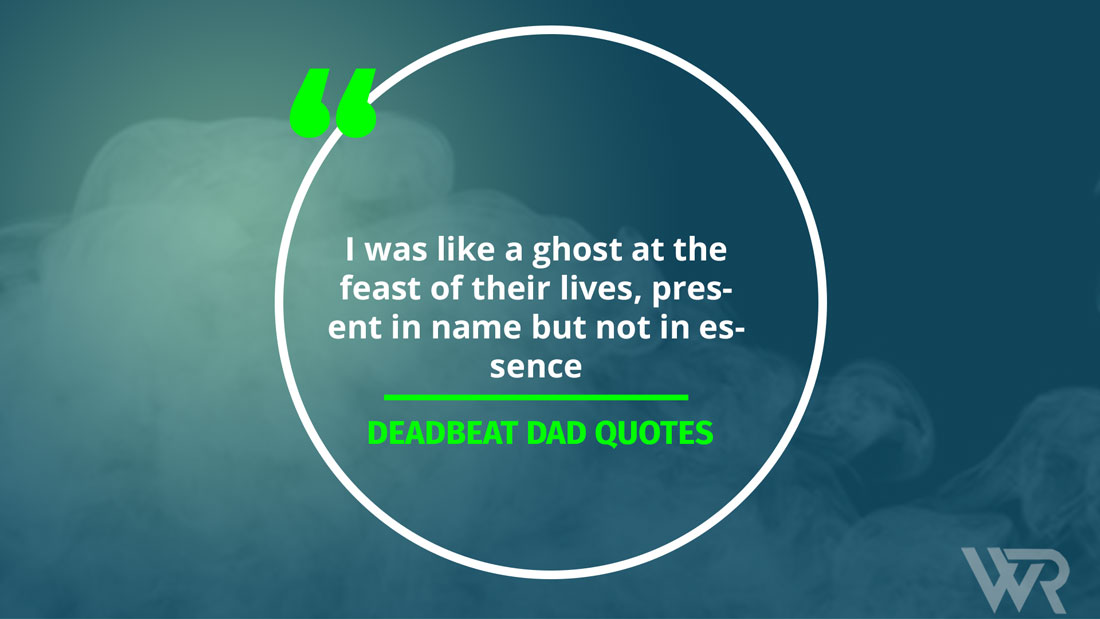
“I was like a ghost at the feast of their lives, present in name but not in essence.”
Finally, this quote captures the essence of being physically present but emotionally and spiritually absent.
The imagery of a ghost at a feast, where there should be joy and celebration—highlights the hollowness and insubstantial nature of a presence that lacks genuine emotional engagement and connection.
Also Read: Rejection Quotes (with Commentary)
Final Thought
Deadbeat Dad Quotes poignantly encapsulate the profound and lasting effects of paternal absence. These quotes serve as stark reminders of the deep emotional scars left on both children and fathers due to neglect and absence. They highlight the irreplaceable role of a father in a child’s life and the void that is created when this role is not fulfilled.
Through their raw honesty and reflective depth, these quotes offer a catalyst for introspection and change, urging absent fathers to recognize the impact of their actions and inspiring them to seek reconciliation and healing.
Ultimately, these quotes stand as powerful testimonies to the importance of presence, responsibility, and the enduring bond between a father and his children.

